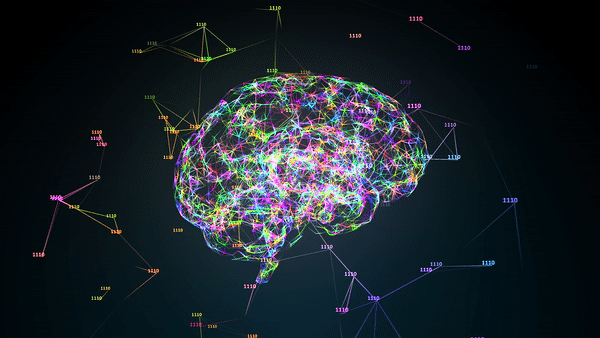
We all know that content creation is a time-consuming and collaborative endeavor. And it can be prohibitively expensive.
But the good news is that intelligent content, (AI, machine learning, automation, data analytics, etc.) can and will make our lives easier in one of the most hard-working, labor-intensive and costly industries there is.
Can you imagine actually having a decent and realistic work-life balance while working on a production? Rather than working 20+-hour days and having to do a million different things at once, instead you could focus on the important stuff? In the future, intelligent content will care of the mundane, laborious, time-intensive tasks, and even assist with creative acts.
Will AI be able to make content itself? It’s already happened. In 2018 this strange short film was written, directed, edited and even scored by an AI that called itself Benjamin.
But as we can see from this frankly bizarre attempt, machines have got a long way to go before reaching human-equivalent levels of creating entertaining, engaging, moving or even rational content.
All of this is very exciting, or as NVIDIA Director of Advanced Technology for Media and Entertainment Andrew Page told Red Shark News, “All current AI trends are exciting. Some of them are exciting in thrilling ways — like stand-right-at-the-edge-of-a-cliff exciting.”
So, how can these technologies help us?
PRE-PRODUCTION
In pre-production, there are so many challenges and problems to be solved — scheduling, casting, location scouting, script breakdowns, props and VFX requirements, budgeting, etc. — and technology can help us to do all this much more efficiently. For example, it can analyze the schedules of cast and crew and plan a shoot schedule based on the data.
Although machines aren’t able to write convincing scripts (yet), they are able to help us break down scripts and analyze them to help with the pre-production process.
BOOST YOUR BOTTOM LINE WITH INTELLIGENT CONTENT:
What is intelligent content? Designed to be used for multiple purposes across multiple platforms and technologies, intelligent content is media that is rich with data and metadata, enabling us to find, reuse and endlessly adapt it. Learn how intelligent content can boost your bottom line with these expert insights curated from the NAB Amplify archives:
- Your Business in 2025 is Data-Driven, Right? (Right?)
- Smaller, Smarter Data Needed to Train and Scale AI
- Learn How Data, AI and Automation Will Shape Your Future
- Watch This: How Intelligent Content Advances Creativity
- Intelligent Content Kickstarts Your Creativity and Challenges You to Be Better at Your Job
Algorithms can devise questions and posit doubts. Are parts of the plot too similar to existing stories? Have these character names been used before for another project? It could even highlight dialogue that is cliché or isn’t working for some other reason. And it can do it all much faster than human beings, saving time and money during an important and intensive phase.
Data analytics are helping casting directors to find the right actors for their content, mining on statistic to determine regarding how well actors have performed in various genres — and how audiences have responded to these roles.
AI and bots are helping in with invoicing and payments, streamlining the accounting department, decreasing budgets and making sure freelancers get paid on time (what a dream!).
And now, here’s a preproduction-themed rabbit hole to inspire you:
- First, here’s how script breakdowns work.
- And here’s a Script Breakdown 101 and a look at how new AI software is cutting down the time needed from days to minutes
- Learn how a production company was able to create a remote production in super-fast time using virtual location scouting, 3D mapping and geodata models.
- Largo.ai, an award-winning, artificial intelligence software provider, gave their algorithms the chance to cast the next James Bond. But how did it match with who humans want to see?
- Here’s an overview for how content creators can utilize intelligent content tech in their productions — and how they can learn to trust it.
- New IC technologies can cut budgets and enable almost anyone to make great-looking content
PRODUCTION
Not only can intelligent content streamline workflows to create a healthier environment for creatives and enable inclusivity, but within the production process, the practical implications of new technology are staggering.
Here’s a quick look at some new technology trends in media production, courtesy of Geek Vibes Nation.
Naturally, a lot of these technological advances have come from the gaming industry. Here are some ways in which the media and entertainment industry have used gaming innovations to revolutionize production techniques.
Things like remote and virtual production, deep fakes and robots, stuntronics, smart tech, LED walls and motion capture, AI. content creation and music generation etc. are making production advancement in the media industry change faster and smarter than ever before.
Take a look at some of these tech advances in this production-themed rabbit hole:
- Here’s an article about how AI has been used for live sports broadcasts and how Hollywood is planning to adopt these techniques.
- Remote production can not only reduce commute times and carbon footprints, but it can also help increase diversity in the industry by including creatives who live outside traditional production hubs like L.A., New York, London. But has remote production changed production forever?
- Here’s how remote production can improve sports broadcasting.
- Find out how this animated sci-fi pilot was created remotely, in real-time.
- Virtual production is yet another innovation that has been led by the gaming industry.
- Here’s a look at some technologies used in virtual production and what it means for our industry.
- AI-generated gaming environments are discussed in this podcast.
- And a fan favorite: dive into how The Mandalorian reinvented motion capture and green screen applications.
- In the near future, robots could perform in dangerous scenes, reducing risk for actors and stunt people.
- What about deep fakes and de-aging techniques, which can be deployed to feature younger versions of actors (or even cast deceased actors) in films and TV programming?
- Robots are even getting in on the other side of casting — starring as the lead themselves. But we are still a long way from replacing our beloved human stars entirely.
POST-PRODUCTION
It could be argued that it is in post-production where the most mind-blowing and exciting advancements are taking place, particularly in VFX and automation of processes that have previously been painstaking, time-consuming processes. And this can’t help but impact both pre-production and production itself, as this Red Shark News article explains.
Amplify recently spoke to Special Circumstances’ Anton Marini and Rahul Somani, who told us that new technologies are allowing assistant editors to be freed from mundane, repetitive tasks to focus on creative work. (They are doing very cool things in this space!)
Explore this post-production rabbit hole for a more detailed look at what’s happening in this space:
- First, an overview of how AI is transforming the VFX industry.
- Here’s how AI and automation are improving captioning and other resources to make media more accessible to those with hearing impairment.
- Read how Warner Bros. used a deep fake generator to enable anyone who uploads their photo to star in its Reminiscence movie trailer.
- Here’s an in-depth look at the greatest leap in post-production technological advances since CGI.
- This is a technical breakdown of how to become an ”amplified creative” with a particular focus on advancements in post-production.
- You can read about the future of lip-syncing here.
- From automatically curating video footage to fully automated editing systems, this article explains it all.
- Read more about how AI is helping with encoding, logging, content moderation, producing highlight reels and more.
SOME PRELIMINARY CONCLUSIONS ABOUT IC AND CREATION
If intelligent content can help us reduce the time spent on non-creative tasks, perhaps we can all enjoy more time outside of the industry and doing other endeavors that improve our lives and inform our stories.
Work-life balance and outsized expectations (as demonstrated by this anonymous Instagram account) are some of the top reasons listed as to why people leave the industry. With machines helping us out, we should be able to retain existing talent and even focus on attracting new creatives.
As a result of technological advances and new workflows, the future (and indeed the present) means giving access to diverse pools of creative talent that previously might have struggled to make content of any kind. Or it might bring down the costs of bringing high-end, epic stories to life. Or it just might mean that we can bring previously unseen visions to life in ways which we never thought possible, which will, in turn, lead to a more innovative kind of content to inspire future generations. Our only limits now are our imaginations.
Continue the deep dive with this general interest rabbit hole and join the debate…
- As evidenced by the bizarre short film Zone Out, AI scriptwriting has a long way to go — but this M.L. attempt to replicate the writing style of Greta Gerwig suggests AI’s future capabilities.
- Are deepfakes the future of content creation?
- Check out this webinar on the emergence of AI and ML in creative media.
- Listen to this podcast that discusses elements of virtual production, including remote collaboration and LED wall cinematography.
- How exactly did a YouTuber turn his young Luke Skywalker deepfake into a gig with Lucasfilm?
- Duran Duran can thank AI for this ‟Invisible” music video.
- Actually, you can make your own AI music video.
- Facebook used AI to help users animate their children’s drawings.
- This animated sci-fi short was made entirely through remote production.
- This podcast episode takes listeners through the history of motion capture.
- And for your consideration: 17 AI trends and applications in media and entertainment.
- What are the tech innovations that changed the media industry through the ages?
- NVIDIA’s podcast discusses all things AI and media, among other things.




